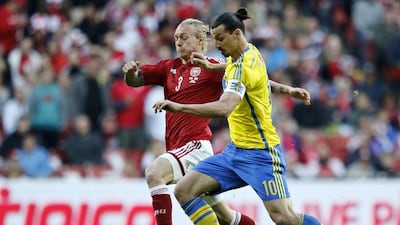In many respects, they have a reputation as the most civil of neighbours. Denmark and Sweden rank among the most desirable places to live in Europe, the epitome of polite, generous, noble democracies. Put them in opposition on the football field, however, and theirs is a rivalry that easily turns raucous.
The Scandinavian nations with the richest football pedigrees would have preferred to play anyone else in the battle for one of the final four places at the finals of Euro 2016. Ahead of Saturday night’s first leg, a few ghosts from a long history of close, often controversial European contests will be lingering around Solna.
Most notorious was the way in which Sweden edged ahead of Denmark in the race for a single place at the finals of Euro 2008. They shared a group with Spain, who made their way to top spot, leaving one further qualifying place. Much hinged on the meeting between Denmark and Sweden in June 2007. Two points separated the sides going into the fixture, and the Swedes set about consolidating their narrow advantage going into the game.
Read more Euro 2016 qualifying news:
Ali Khaled: Thierry Henry says expectations high but France can win Euro 2016
Barely a quarter of the way in, goals from Johan Elmander and Petter Hansson had Sweden up 2-0. By the 27th minute, Elmander had struck again: 3-0 to the visitors. This, from a Sweden without their 21st century strikers in the starting line-up. Zlatan Ibrahimovic had fitness issues; Henrik Larsson was in one of his many, later reversed, international retirements.
That was not the end of the story, however. Denmark, roared on by some of the most enthusiastic fans in international football, pulled back to 3-2, thanks to Daniel Agger and Jon Dahl Tomasson, by just after the hour. There was momentum. The mercury rose. Leon Andreasen, a Danish substitute, scored his team’s third goal with 15 minutes left on the clock.
Quite enough drama, already, to hoist that particular meeting into the top 10 of the more than 100 clashes through the years between teams who have, at various times, punched well above their weight in international tournaments. Sweden’s population is around 10 million, Denmark’s less than six million.
Denmark will always have a soft spot for the European championship, thanks to the remarkable events of 1992. They were parachuted, late, into the finals that year because of the exclusion, for political reasons, of Yugoslavia, who had qualified ahead of the Danes. They went on to win the trophy, a triumph watched with glee by neutrals who enjoy an underdog fairytale, but not much by the host nation, which was Sweden. They had actually beaten Denmark in the group phase.
The see-saw swung back a little at the 1994 World Cup, where Sweden achieved a notable third place, their best since finishing as runners-up when they staged the 1958 World Cup. The neighbours’ respective records at tournaments since the turn of the millennium has been a tale of keeping pace with one another, more or less, both middle-ranking nations, capable of springing the odd surprise.
But back to June 2007. The epic clash would turn sour. With the score poised at 3-3, and into the 90th minute, the teak-tough Danish midfielder Christian Poulsen had a penalty awarded against him after an ugly clash with Sweden striker Markus Rosenberg. Before the spot-kick could be taken, a fan, a Dane, invaded the pitch intent on attacking referee Herbert Fandel. The result: match abandoned, a 3-0 default score in favour of Sweden who went on to the finals, Denmark finishing six points beneath them.
Nobody wants a repeat of that tonight or in Denmark next week. But the stakes are high. A Danish victory – and they are on a good run of them in recent games against the Swedes – would mean no Ibrahimovic at France 2016. A Danish defeat and Morten Olsen, their coach, may well bring the curtain down on a uniquely long managerial stint. He has been in the job since 2000.
Follow us on Twitter @NatSportUAE


